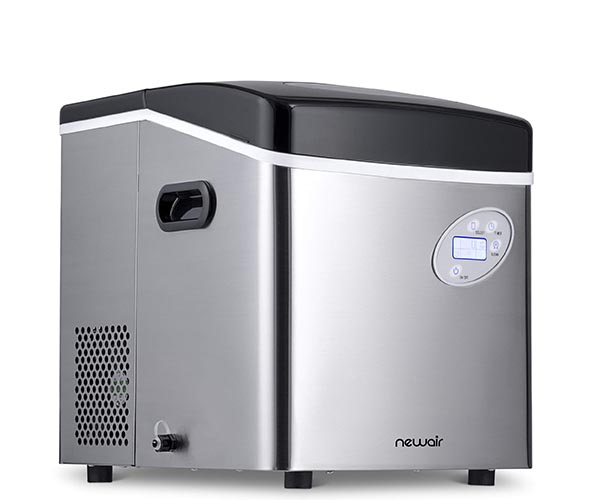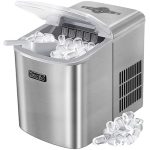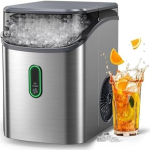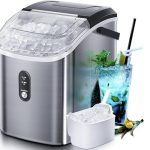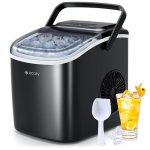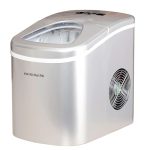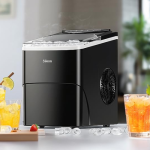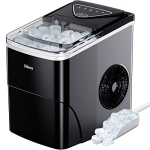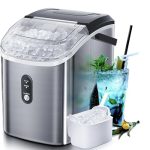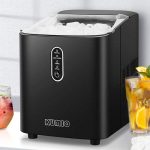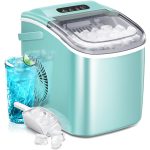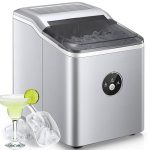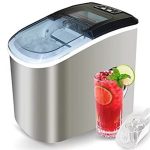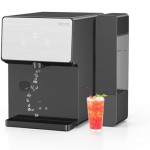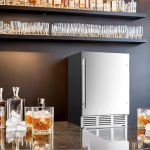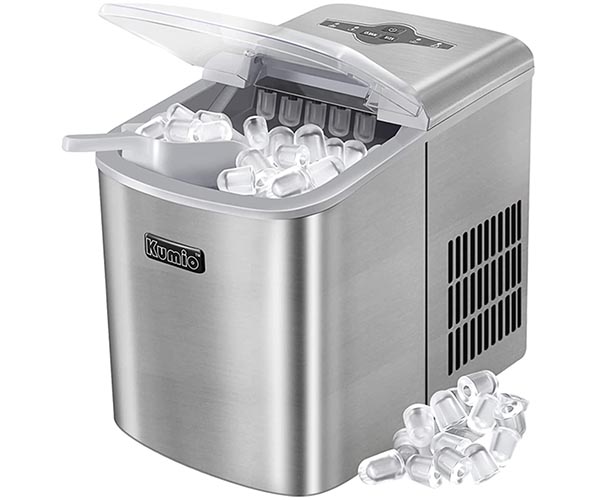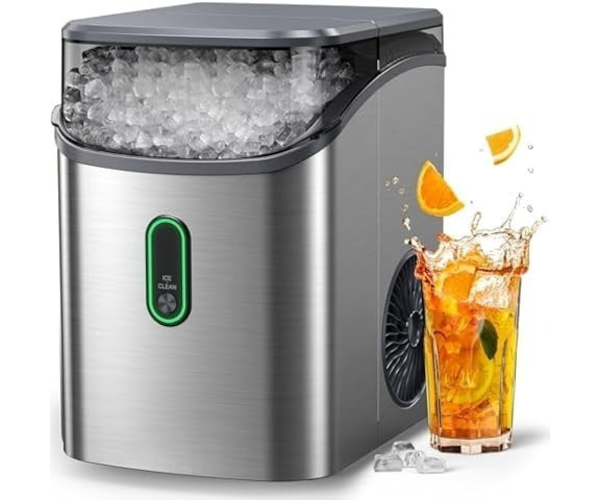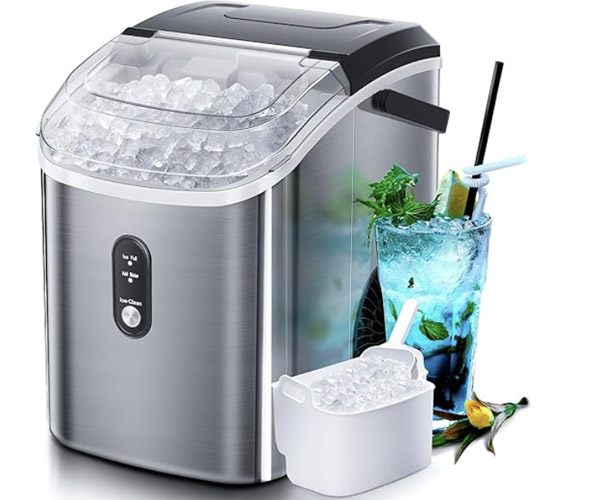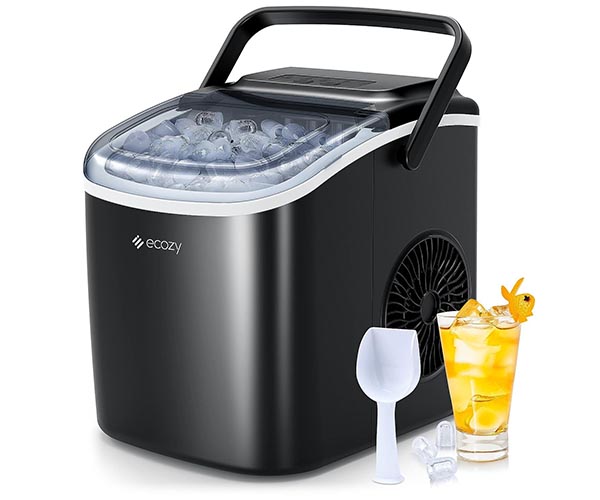Introduction
Imagine this: It’s the height of summer, and you’re hosting a weekend barbecue for friends and family. The drinks are chilled, the grill is fired up, and everyone’s in a great mood—until your countertop ice maker suddenly quits. Amidst the fun, your handy appliance decides it’s the perfect time to take a break, leaving you with a warm soda and puzzled guests. Why? It could well be due to lack of maintenance—a common oversight that many of us are guilty of. https://amzn.to/3WoePQf
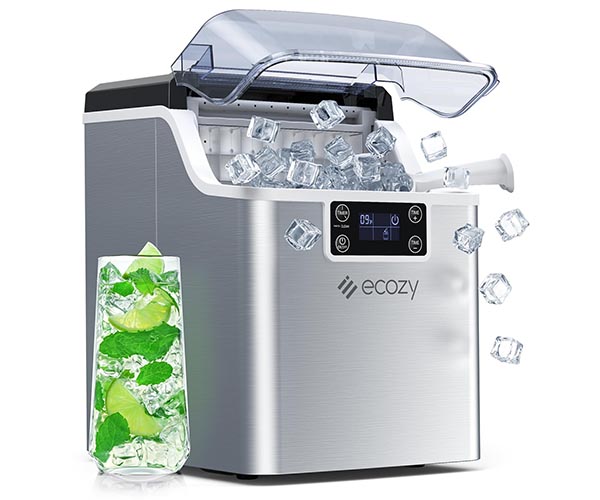
Maintaining your countertop ice maker isn’t just about ensuring it works when you need it most; it’s about securing your investment in the long run. Here’s why regular maintenance is not just recommended but essential:
- Efficiency: Regular cleaning and maintenance ensure that your ice maker operates at peak efficiency. Over time, hard water can cause mineral buildups that may hinder the ice-making process and affect the taste and clarity of the ice. Addressing this routinely avoids such issues.
- Longevity: Like any appliance, ice makers last longer when they’re well-cared for. Regular maintenance can prevent wear and tear from escalating into serious damage, thus extending the lifespan of your machine.
- Safety: Neglected ice makers can become a breeding ground for mold and bacteria due to standing water and leftover residues. Regular cleaning is crucial to ensure that the ice produced is safe to consume.
- Cost-effective: Preventative maintenance might incur a small cost, but it can prevent expensive repairs or the need for a premature replacement.
- Performance: A well-maintained ice maker consistently produces high-quality ice in terms of both taste and appearance, which can be crucial for beverage-centric gatherings.
Understanding the importance of these factors can help ensure that your ice maker remains a reliable part of your kitchen appliances. So, how often should you engage in professional maintenance to keep your ice maker in tip-top condition? Let’s delve deeper into the maintenance schedule and practices that will help you avoid the inconvenient and embarrassing scenario described earlier.
Understanding Your Countertop Ice Maker
Before diving into the maintenance specifics, it’s crucial to grasp some basics about how these handy devices work and recognize the common signs that hint your machine needs attention.
Basics
A countertop ice maker is a compact, stand-alone appliance that quickly produces ice without the need for a permanent water line—just fill the reservoir with water, plug in the unit, and enjoy fresh ice within minutes. Here’s a quick rundown of how they typically operate:
- Water Reservoir: You manually fill the reservoir with water, which is then pumped into a refrigerated ice tray at the top of the unit.
- Freezing Cycle: The water in the tray is chilled until it freezes into ice. This process is accelerated by the appliance’s built-in compressor and refrigerant.
- Ice Harvesting: Once the ice is frozen, heat is applied briefly to loosen the ice cubes, which are then scooped out by a rotating arm and dropped into a storage basket.
- Recycling: Any melted water from the storage basket is recycled back into the reservoir to be frozen again.
Common types of countertop ice makers include:
- Bullet Ice Makers: These produce bullet-shaped ice with hollow centers—fast and efficient, ideal for soft drinks.
- Clear Ice Makers: Produce denser and clearer ice cubes that melt slower, perfect for cocktails.
- Nugget Ice Makers: Produce chewable, soft nuggets of ice, favored in many beverages.
Signs of a Neglected Ice Maker
Recognizing the signs of wear or neglect can help you address issues before they worsen. Here are some indicators that your ice maker needs maintenance:
- Slow Ice Production: If your machine takes longer than usual to produce ice, it might be struggling with scale buildup or mechanical issues.
- Small or Incomplete Ice Cubes: When ice cubes are smaller than normal, or seem misshapen, it’s often a sign of low water flow to the ice mold, possibly due to a clogged filter or insufficient water in the reservoir.
- Noisy Operation: Unusual sounds during the ice-making process could indicate mechanical problems or buildups that interfere with the normal operation.
- Off-tasting Ice: If the ice begins to taste bad, there might be mold, mildew, or bacteria in the ice-making path or storage bin.
- Leaks: Water on the countertop around your ice maker is a clear sign of a leak, which could stem from a loose connection or a crack in the reservoir.
- Frequent Ice Clumping: This happens when the ice doesn’t freeze individually due to high internal temperatures or issues with the defrost cycle.
Understanding these basics and being able to recognize these signs are the first steps toward effective maintenance, ensuring your ice maker remains functional and efficient.
How Often to Clean Your Ice Maker: The Professional Advice
Maintaining your countertop ice maker isn’t just about responding to problems as they arise; it’s about preventing them through regular, scheduled care. Professionals in the appliance maintenance field recommend a standard cleaning frequency, but this can vary based on several factors.
General Guidelines
For most types of countertop ice makers, professionals suggest adhering to the following maintenance schedule:
- Monthly Cleaning: At a minimum, clean your ice maker once a month to ensure optimal performance and hygiene. This includes sanitizing the water reservoir, ice storage bin, and the internal mechanisms that come into contact with water.
- Deep Cleaning Every 6 Months: Every six months, conduct a thorough cleaning that involves descaling to remove hard water deposits, especially if you use tap water. This process might require a specialized cleaning solution recommended by the manufacturer.
- Annual Professional Check-Up: Even with regular personal maintenance, an annual check-up by a professional can help address any mechanical issues and ensure your ice maker is functioning correctly.
These guidelines provide a foundation, but several factors might necessitate more frequent maintenance:
Factors Affecting Maintenance Schedule
- Usage Frequency:
- Heavy Use: Ice makers used multiple times a day, such as in a small business or during hot weather, may need bi-weekly cleanings to keep up with the demand and maintain ice quality.
- Light Use: Machines used less frequently, such as in a seasonal vacation home, may be fine with the standard monthly cleaning.
- Water Quality:
- Hard Water: In areas with hard water, mineral buildup can occur more quickly, potentially clogging the machine’s components and requiring more frequent descaling.
- Filtered or Softened Water: Using filtered or softened water can decrease the frequency of descaling treatments needed.
- Type of Ice Maker:
- Manual Fill Machines: Since these require you to add water manually, they can be more prone to contamination and may benefit from more frequent cleanings.
- Automatic Machines: These typically connect directly to a water line and often include filtration systems, which might reduce the frequency of required cleanings, but still necessitate regular checks to ensure the filters and mechanisms are clean.
By understanding and adapting to these factors, you can create a customized maintenance schedule that keeps your countertop ice maker in prime condition, ensuring it provides high-quality ice without interruption.
Step-by-Step Guide to Basic Maintenance
Maintaining your countertop ice maker doesn’t have to be a daunting task. By incorporating simple cleaning tasks into your daily and weekly routines, and performing more thorough checks monthly, you can keep your appliance in excellent working condition. Here’s how to approach these maintenance tasks:
Daily and Weekly Tasks
For optimal performance and hygiene, incorporate these simple tasks into your daily or weekly routine:
- Daily Exterior Wipe-Down: Each day, use a damp cloth to wipe down the exterior surfaces of the ice maker. This prevents dust and kitchen grime from building up, which can eventually make their way into the machine.
- Weekly Interior Inspection and Cleaning:
- Inspect the Ice Bin: Remove any old ice; rinse and dry the bin to prevent ice clumping and potential contamination.
- Check the Water Reservoir: For manual fill models, ensure the water reservoir is clean and free of debris. Change the water if the ice maker is not used daily.
These tasks are quick and easy to perform, ensuring that your ice maker remains clean and functional without requiring much time or effort.
Monthly Checks
Monthly maintenance is more comprehensive, focusing on the internal mechanisms and deeper cleaning:
- Sanitize the System:
- Use a solution recommended by the manufacturer or a mild detergent mixed with water to thoroughly sanitize accessible parts of the ice maker. This includes the water reservoir, ice tray, and any other components that come into contact with water.
- Ensure to rinse all parts thoroughly after cleaning to avoid leaving any residue that could affect the ice’s taste or smell.
- Descaling:
- If your water supply is hard, descaling is crucial to remove mineral buildup that can hinder the efficiency of your ice maker. Use a descaling solution suitable for your machine according to the manufacturer’s instructions. This generally involves running the solution through the machine and then running several cycles with clean water to ensure no cleaning chemicals remain.
- Check and Replace Filters:
- If your ice maker has a water filtration system, check the filter monthly and replace it as recommended by the manufacturer. This ensures clean, fresh-tasting ice and optimal operation of the machine.
- Inspect Seals and Hoses:
- Check any seals around the door (if applicable) and hoses for wear and tear. Replace any parts that show signs of deterioration to keep the unit sealed and functioning properly.
By following this step-by-step guide to basic maintenance, you not only extend the life of your countertop ice maker but also ensure it operates safely and efficiently, providing you with fresh and clean ice whenever you need it. https://amzn.to/3WoePQf
When to Call in the Professionals
While regular self-maintenance can keep your countertop ice maker running smoothly most of the time, there are occasions when professional expertise is required. Knowing the signs that indicate the need for professional help can save you from more severe and expensive repairs down the line.
Signs You Need Professional Help
Be vigilant for these indicators that suggest it’s time to call in a professional for a maintenance check:
- Persistent Issues Despite Regular Maintenance: If problems persist even after regular cleaning and descaling, this might indicate internal issues that require professional attention.
- Unusual Noises: Sounds like rattling, clanking, or grinding during operation are not normal and could suggest mechanical problems that a professional needs to address.
- Water Leaks: Any signs of water leaking from the machine are a clear call for professional intervention, as this could be due to internal issues or faulty connections.
- Poor Ice Quality: If the ice maker continues to produce low-quality ice (cloudy, soft, or foul-smelling) despite your cleaning efforts, there could be deeper issues with the water line or internal components.
- Rapid Ice Melting: Ice that seems to melt unusually quickly could indicate a problem with the cooling system, requiring a professional’s diagnostic skills.
What Professional Maintenance Involves
A professional maintenance visit for your countertop ice maker typically involves several key actions:
- Comprehensive Inspection: The technician will thoroughly inspect your ice maker for any signs of wear and tear, checking all components including the motor, pump, and thermostat.
- Deep Cleaning: Professionals have the tools and solutions to perform a deeper clean than typically possible at home, including areas that are not easily accessible, which can help eliminate any mold, bacteria, or buildup.
- Part Replacements: Any worn-out or defective parts can be identified and replaced during a professional visit. This includes filters, seals, and hoses that might not be readily apparent to the untrained eye.
- System Optimization: Technicians can also optimize the performance of your ice maker, adjusting settings and ensuring that all mechanical components are functioning as they should.
- Expert Advice: After the maintenance check, professionals can offer tailored advice on how to better care for your ice maker based on its specific model and usage patterns.
By understanding when to call in the professionals and what to expect from their services, you can ensure that your ice maker remains in optimal condition, ready to deliver excellent performance when you need it most.
DIY vs. Professional Maintenance
Deciding between DIY and professional maintenance for your countertop ice maker involves weighing the pros and cons of each approach. Understanding when each is appropriate can help you maintain your ice maker effectively while managing costs.
Pros and Cons
DIY Maintenance:
- Pros:
- Cost-Effective: DIY maintenance primarily involves your time and the cost of basic supplies, which are generally inexpensive.
- Convenience: Performing your own maintenance means you can do it on your schedule without having to wait for a professional.
- Routine Care: Regular DIY cleaning can prevent many common issues and extend the life of your appliance.
- Cons:
- Limited Scope: DIY maintenance can only go so far. You may not be able to thoroughly clean or diagnose deeper mechanical issues.
- Risk of Damage: Incorrect handling can lead to damage or void warranties if the maintenance is not performed according to the manufacturer’s guidelines.
Professional Maintenance:
- Pros:
- Expertise: Professionals have the necessary skills and tools to thoroughly diagnose and fix complex issues.
- Comprehensive Service: Professionals can perform tasks that go beyond basic maintenance, such as recalibrating the machine or replacing worn-out components.
- Warranty Compliance: Using professional services ensures that maintenance is done according to the manufacturer’s standards, which is important if your ice maker is under warranty.
- Cons:
- Cost: Professional services can be expensive, especially if they involve replacement parts or complex repairs.
- Scheduling: You may need to work around the availability of a technician, which can be inconvenient.
Cost Comparison
When comparing costs, consider both immediate and long-term financial impacts:
- DIY Maintenance:
- Immediate Costs: Low; typically involves purchasing cleaning agents or minor replacement parts like filters.
- Long-Term Costs: Potential high costs if improper maintenance leads to major repairs or if the machine needs to be replaced sooner due to inadequate care.
- Professional Maintenance:
- Immediate Costs: Higher; professional cleaning or repair services can range from moderate to high costs, depending on the nature of the work.
- Long-Term Costs: Generally lower in the long term, as professional maintenance can help prevent severe issues that lead to costly repairs or replacements.
In summary, DIY maintenance is suitable for regular, simple cleaning and minor adjustments. However, for deep cleaning, troubleshooting, and repairs, especially when dealing with complex mechanical issues or warranty concerns, professional maintenance is the safer and more reliable choice.
FAQs About Countertop Ice Maker Maintenance
1. How often should I clean my countertop ice maker?
Answer: It’s recommended to clean your countertop ice maker at least once a month to ensure optimal performance and hygiene. If you use it heavily or have hard water, consider increasing the cleaning frequency.
2. Can I use vinegar to clean my ice maker?
Answer: Yes, vinegar is a safe and effective cleaning agent for descaling and sanitizing ice makers. Mix equal parts water and white vinegar, run the solution through your machine, and follow up with several cycles of clean water to rinse.
3. What are the signs that my ice maker needs professional maintenance?
Answer: Key signs include persistent operational issues despite regular cleaning, unusual noises, water leaks, poor ice quality, and ice melting quickly. These symptoms suggest deeper problems that require professional expertise.
4. Is it cheaper to maintain an ice maker myself or to hire a professional?
Answer: DIY maintenance is generally cheaper in terms of immediate costs. However, for deep cleaning, troubleshooting, or repairs, hiring a professional can be more cost-effective long-term, as it helps prevent severe issues and extends the lifespan of your appliance.
5. How do I know if my ice maker’s filter needs to be changed?
Answer: Change your ice maker’s filter according to the manufacturer’s guidelines, typically every six months. Signs that a filter needs changing sooner include smaller or cloudy ice cubes and an unusual taste or smell to the ice.
6. What should I do if my ice maker starts leaking water?
Answer: First, check for obvious issues like a full ice bin or a misaligned tray. If these aren’t the problem, it may be a sign of a more serious issue such as a cracked reservoir or loose connection, in which case it’s advisable to call a professional for repair.
Conclusion
To ensure the longevity and efficiency of your countertop ice maker, regular maintenance is not just beneficial—it’s essential. Here’s a recap of the key points we’ve covered in this article:
- Monthly Cleaning: Engage in routine cleaning of your ice maker at least once a month to prevent build-up and ensure hygienic conditions.
- Deep Cleaning and Descaling: Every six months, perform a deep cleaning and descale the machine to handle any mineral deposits, especially if you have hard water.
- Professional Maintenance: Schedule an annual check-up with a professional to handle complex issues and maintain warranty conditions.
- Recognize Signs for Professional Help: Be vigilant for signs like unusual noises, poor ice quality, or mechanical failures, which indicate the need for professional intervention.
- DIY vs. Professional Maintenance: While DIY can save costs on simple tasks, complex issues and deep cleaning might require professional expertise to ensure thorough maintenance and preserve the machine’s functionality.
Maintaining your ice maker shouldn’t be a chore. With the right approach, you can ensure it continues to operate efficiently for years to come. If you haven’t scheduled your next maintenance check, now is the time to do it. Also, consider exploring additional resources and professional services to get the most out of your appliance. Keeping your ice maker in top condition ensures that you’re always ready for any occasion, be it a family gathering or a summer party. Don’t wait until the last minute—regular maintenance is the key to uninterrupted service and great-tasting ice.
Additional Resources
To further assist you in maintaining your countertop ice maker, we have compiled a list of valuable resources that include detailed guides and videos, as well as contact information for professional services. These resources can provide you with more in-depth information and expert assistance to ensure your ice maker remains in optimal condition.
Links to Maintenance Guides
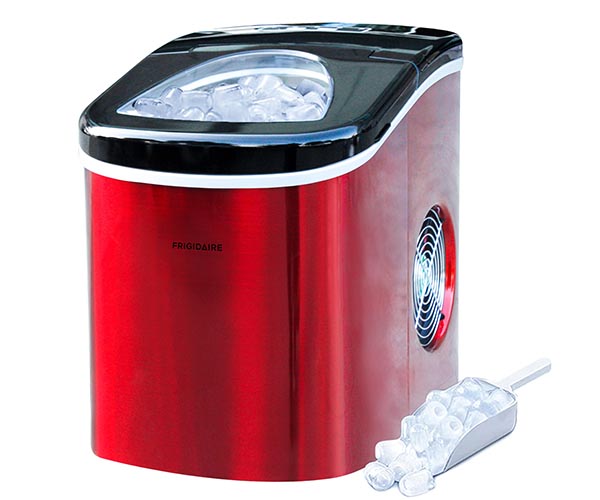
- Ice Maker Cleaning and Maintenance Video Tutorials: Explore a variety of instructional videos on YouTube that demonstrate step-by-step processes for cleaning different types of ice makers. These visual guides are perfect for those who prefer a hands-on learning approach.
- Manufacturer’s Care Instructions: Always refer to the care instructions provided by the manufacturer of your ice maker. Most manufacturers provide detailed maintenance manuals available on their websites.
- DIY Maintenance Blogs: Check out blogs that focus on appliance maintenance. These often include posts and articles with helpful tips and tricks for maintaining your ice maker, tailored to both novice and experienced users.
Professional Services
- Local Appliance Repair Services: Contact a local appliance repair service for professional maintenance and repairs. Look for services that specialize in kitchen appliances and have positive reviews from customers.
- Manufacturer’s Recommended Service Providers: Many ice maker manufacturers recommend specific service providers that are trained to handle their models. You can find these recommendations on the manufacturer’s website or by contacting their customer service.
By leveraging these resources, you can gain greater insight into the care and maintenance of your countertop ice maker, ensuring it continues to function efficiently and effectively. Whether you choose to undertake maintenance yourself or opt for professional help, these resources will guide you in keeping your appliance in top-notch condition. https://amzn.to/3WoePQf
References
- GE Profile Opal Nugget Ice Maker Product Page
- NewAir Countertop Ice Maker Product Page
- Igloo ICEB26HNBK Portable Electric Countertop Ice Maker Product Page
- Scotsman SCN60PA-1SS
- EUHOMY Nugget Ice Maker Countertop
- Silonn Ice Maker Countertop
Additional Resources
- [How often should you clean your countertop ice maker?]
- [What happens if you don’t clean your countertop ice maker regularly?]
- [How does a countertop ice maker work?]
- [How to install a countertop ice maker?]
- [How often to descale a countertop ice maker?]
- [Buying Guide: Countertop Ice Makers with Water Line Connection]
- [Kitchen Upgrade Ideas: Countertop Ice Makers with Water Line]
- [Which countertop ice maker with freezer is best?]

